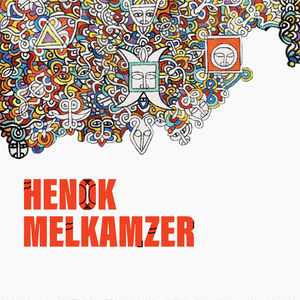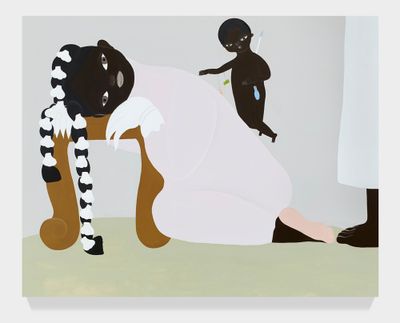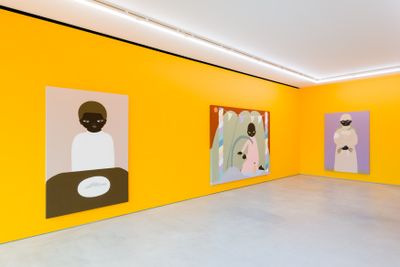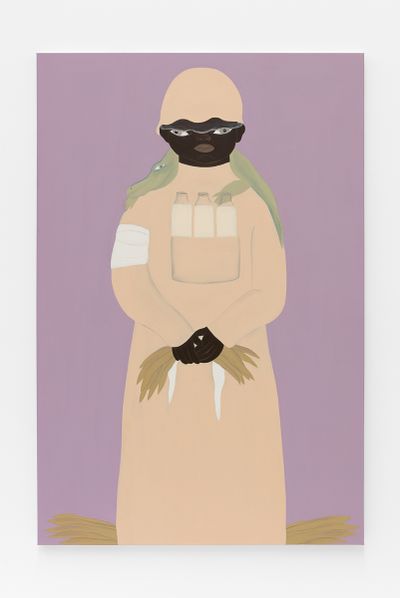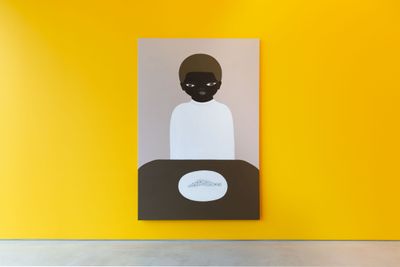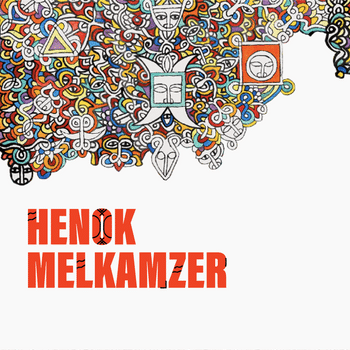Asuka Anastacia Ogawa: Worlds of Interpretation
In February 2017, Asuka Anastacia Ogawa had her first solo exhibition in the studio of Henry Taylor, whom she had been introduced to by a mutual friend. Titled Soup, the event showcased Ogawa's enigmatic paintings of androgynous figures in dream-like settings, their piercing gazes at once challenging and beckoning viewers to enter their world.
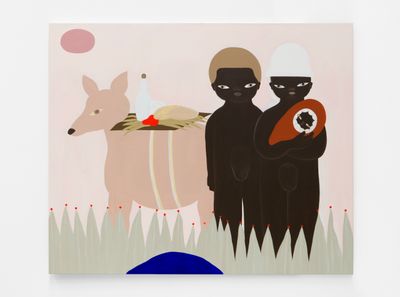
Asuka Anastacia Ogawa, Sand (2020). Acrylic on canvas. 152.4 x 182.88 cm. © Asuka Anastacia Ogawa. Courtesy the artist and Blum & Poe, Los Angeles/New York/Tokyo.
What followed was a sold-out show in New York's Half Gallery in June 2019, titled Feijão (6–29 June 2019), which presented a series of figures rendered in flat tones of dark brown and black. Sinister undertones seem to run through various settings. Standing over a female figure bent over a stool in Cramps (2019) is another figure who may or may not be tending to her ordeal. In Casamento (Marriage) (2019), a newly wedded pair is captured in curious attire—one draped in white with a gag-accessory in her mouth, while the other stands naked, save for a pearl-like boa draped around his neck.
In April 2020, Blum & Poe announced their representation of Ogawa, with the artist's first solo exhibition with the gallery currently on view in Tokyo (23 September–7 November 2020). For Ogawa, the exhibition marks a return of sorts. The artist was born in Tokyo in 1988 but relocated at the age of three with her family to the leafy city of Petrópolis in Brazil, which sits on the border of the Serra dos Órgãos National Park, before moving to Stockholm at 16.
A transition to London followed, and the artist completed her BFA at Central Saint Martins in 2015 in the painting department. She found that the '"intelligence" of an artwork depended on something far more incalculable'1 in painting than in other media.
Now based between New York and Los Angeles, Ogawa's paintings seem to reflect how she moves through the world, with the artist describing them as open to interpretation.
In Tokyo, Ogawa's latest works, of which there are seven on view, continue to draw from personal memories and life experiences, but a pronounced lightness in colour and content is apparent. Rife with playful mystery, flat planes of lambent colour are interspersed between figures and their props—a garland of garlic in Garlic Boy (2020), for instance, or the twirling bands of colour in the poles holding a string of bunting that frame a pink-clad Medicine Girl (2019–2020). Animals make frequent appearances, such as the small alligator resting on the peach-hued shoulders of a figure in Lilly (2019).
Focusing more on mood than narrative, Ogawa employs a minimalistic palette, with heady tonal contrasts providing a sense of restless disquiet amid figures that seem caught in the midst of something, as if interrupted. In Sand (2020), green leaves topped with bright red points are assembled like a picket fence, behind which a deer and two figures, one cradling a baby, stand against a sandy-coloured sky and pink sun, their stares are fixed outwards.
Settings such as these are reminiscent of ancient folklore, and Ogawa has referred to anamnesis—the ability to recall past lives or existences—to discuss the transmission of memory through bloodlines. The process of painting, the artist notes, provides an openness towards these energies. An approach Ogawa approximates to a sense of naivety: 'if you're not naïve in the face of something new, you've already confined the energy coming from within it'.2
With the alignment of Ogawa's paintings' openness with her inter-cultural journeying, her work has been situated within a new generation of painters whose practices 'erase the bias of geography',3 to borrow the words introducing a group show at Almine Rech, Early 21st Century Art (2 October–17 November 2018), in London, which brought together Asuka's work alongside nine others including Alex Becerra, Amy Bessone, and Nathaniel Mary Quinn.
In the context of Covid-19, the erasure of geographical bias is an alluring one, as responses to the pandemic are increasingly shaped by nationalism, rather than internationalism. Ogawa's paintings, rooted in a sense of wonderment and the unknown, testify to painting's capacity to transcend borders.—[O]
1 Georgia Tatjana Mota, 'Asuka Anastasia Ogawa: Naïveté Series', Happening, 28 April 2017, https://www.happening.media/category/magazine/en/series/2800/asuka-anastasia-ogawa-navet-ser
2 Ibid.
3 Press release for Early 21st Century Art, exhibition at Almine Rech, London, https://www.alminerech.com/press-release/en/5170-early-21st-century-art



